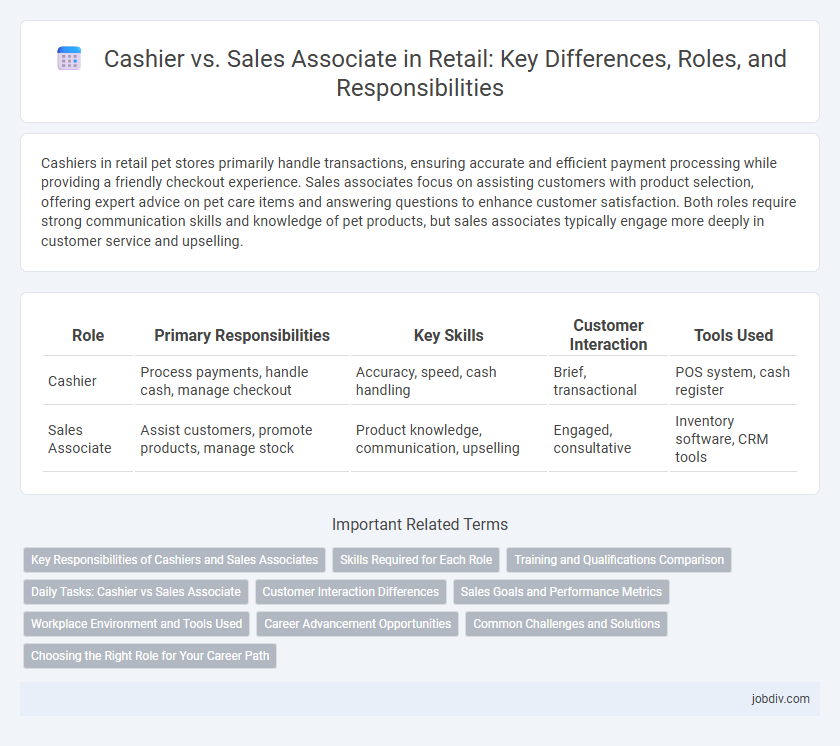Cashiers in retail pet stores primarily handle transactions, ensuring accurate and efficient payment processing while providing a friendly checkout experience. Sales associates focus on assisting customers with product selection, offering expert advice on pet care items and answering questions to enhance customer satisfaction. Both roles require strong communication skills and knowledge of pet products, but sales associates typically engage more deeply in customer service and upselling.
Table of Comparison
| Role | Primary Responsibilities | Key Skills | Customer Interaction | Tools Used |
|---|---|---|---|---|
| Cashier | Process payments, handle cash, manage checkout | Accuracy, speed, cash handling | Brief, transactional | POS system, cash register |
| Sales Associate | Assist customers, promote products, manage stock | Product knowledge, communication, upselling | Engaged, consultative | Inventory software, CRM tools |
Key Responsibilities of Cashiers and Sales Associates
Cashiers primarily handle transactions, process payments, issue receipts, and manage cash registers with accuracy and efficiency. Sales associates focus on customer assistance, product recommendations, maintaining store displays, and ensuring an engaging shopping experience. Both roles contribute to smooth store operations but emphasize different aspects of customer interaction and sales processes.
Skills Required for Each Role
Cashiers require strong numerical accuracy, speed in transaction processing, and basic customer service skills to efficiently handle payments and resolve checkout issues. Sales associates need advanced product knowledge, persuasive communication, and relationship-building abilities to effectively engage customers and drive sales. Both roles benefit from problem-solving skills and a positive attitude, but sales associates emphasize proactive selling while cashiers focus on accuracy and efficiency.
Training and Qualifications Comparison
Cashiers typically require basic training focused on operating point-of-sale systems and handling transactions efficiently, often completed within a few days. Sales associates undergo broader training that includes product knowledge, customer service skills, and sales techniques, usually spanning several weeks. Qualifications for sales associates often demand strong interpersonal skills and a deeper understanding of merchandise, whereas cashiers need foundational math abilities and attention to detail.
Daily Tasks: Cashier vs Sales Associate
Cashiers primarily focus on processing customer transactions, handling payments, and issuing receipts swiftly and accurately to ensure a smooth checkout experience. Sales associates engage in assisting customers with product selection, providing detailed information about merchandise, and maintaining the sales floor's organization to enhance customer satisfaction and drive sales. Both roles require strong communication skills and attention to detail but differ in their emphasis on transactional duties versus customer service and sales support.
Customer Interaction Differences
Cashiers primarily engage with customers during the checkout process, focusing on transactions, payment processing, and bagging items efficiently. Sales Associates maintain ongoing interactions throughout the shopping experience, offering product knowledge, personalized recommendations, and assistance to enhance customer satisfaction. This distinction highlights Cashiers' role in finalizing sales versus Sales Associates' involvement in building customer relationships and driving sales through service.
Sales Goals and Performance Metrics
Sales associates directly influence retail sales goals by engaging customers and driving product purchases, using performance metrics like conversion rates, average transaction value, and upsell success to measure effectiveness. Cashiers primarily focus on transaction accuracy and speed, with key metrics including checkout time, error rates, and customer satisfaction scores impacting overall store efficiency. Both roles contribute to sales performance, but sales associates play a more active role in achieving revenue targets through customer interaction and sales strategies.
Workplace Environment and Tools Used
Cashiers typically work at fixed checkout stations equipped with point-of-sale (POS) systems, barcode scanners, and cash registers, designed for efficient transaction processing. Sales associates operate across the retail floor, using mobile devices for inventory checks, customer assistance, and sales tracking within dynamic and customer-focused environments. Both roles require familiarity with retail software, but cashiers emphasize transactional accuracy while sales associates prioritize personalized customer interactions and product knowledge.
Career Advancement Opportunities
Cashiers often have limited career advancement opportunities, typically progressing to supervisory roles within the checkout area. Sales associates benefit from broader skill development, enabling transitions into positions such as merchandisers, customer service managers, and store supervisors. Retail organizations increasingly favor promoting sales associates due to their direct customer interaction and product knowledge.
Common Challenges and Solutions
Cashiers and sales associates often face challenges such as managing high customer volumes, handling complex transactions, and maintaining product knowledge to provide accurate assistance. Solutions include implementing comprehensive training programs, utilizing point-of-sale (POS) systems with user-friendly interfaces, and fostering strong communication skills to effectively address customer inquiries. Streamlined processes and ongoing support help both roles improve efficiency and enhance the overall shopping experience.
Choosing the Right Role for Your Career Path
Cashiers primarily handle transaction processing and customer payment interactions, requiring strong attention to detail and quick numerical skills. Sales associates engage more deeply with customers by assisting with product selection, providing personalized recommendations, and driving sales through rapport-building. Selecting the right role depends on your strengths and career goals: cashiers excel in fast-paced, detail-oriented environments, while sales associates benefit from strong communication skills and a passion for customer relationship management.
Cashier vs Sales Associate Infographic

 jobdiv.com
jobdiv.com